-
Posts
17365 -
Joined
-
Days Won
354
Posts posted by Coss
-
-
Loading...
The 14.8 million tonnes of mineral resources discovered recently in Phang Nga province may not be entirely lithium, a rare mineral which is a key component for making batteries for electric vehicles, a government official clarified on Saturday.
“The 14.8 million tonnes discovered are the total amount of mineral resources and not lithium resources,” deputy government spokeswoman Radklao Inthawong Suwankiri said. “Mineral resources could contain several kinds of minerals, including lithium.”
Earlier on Thursday, Radklao had quoted an Industry Ministry report which confirmed the capacities of the Ruangkiat and Bang Etu sites in Phang Nga province, south of Thailand.
The report said the sites contained lepidolite, which has an average lithium oxide of 0.45%. With proper mining and refining operation, the sites could produce raw material to make lithium-ion battery for at least 1 million units of 50 kWh electric vehicles.
Radklao had said on Thursday that the finding of high lithium content in Phang Nga makes Thailand the country with the third largest lithium resources after Bolivia and Argentina.
However, on Saturday she quoted the Department of Primary Industries and Mines as saying that the earlier report was a misunderstanding, as the discovery confirmed availability of mineral resources and not purely lithium resources.
This also invalidates the claim that Thailand has the third largest lithium resources in the world.
“The discovery of 14.8 million tonnes of mineral resources is still a good news for all Thais, regardless of the amount of lithium found,” said Radklao. “All key mineral resources found in Thailand, be they lithium, sodium or potash, can contribute to the country’s economic stability and reduce reliance on import.”
She added that the government is committed to promoting the EV industry in Thailand under its EV3.5 campaign, which also includes promoting Thailand to be a hub of EV battery manufacturing in the region.
The government’s clarification on Saturday came after several parties criticised the report of lithium discovery in Phang Nga as inaccurate.
Chulalongkorn University science lecturer Jessada Denduangboripant posted on his Facebook page on Friday that the average amount of lithium that could be extracted from 14.8 million tonnes of mineral resources is only about 66,600 tonnes.
It is estimated that there are about 93 million tonnes of lithium resources in the world, most of which are in South America. The top 10 countries with confirmed lithium resources are: Bolivia (21 million tonnes), Argentina (20 million), Chile (11 million), Australia (7.9 million), China (6.8 million), Germany (3.2 million), Congo (3 million), Canada (2.9 million), Mexico (1.7 million), and Czech Republic (1.3 million).
“With 66,600 tonnes of lithium, Thailand will be ranked in 22nd place, between Finland (68,000) and Austria (60,000),” he said...
-

A Singaporean TikTok user documented her gastronomic adventure at the night markets of Bangkok on January 14 when her intrigue in freshly fried insects landed her in hospital.
In a 30-second video, Nicolette Wee enthusiastically showcased her purchase of a bag of grasshoppers.
“So thick, fat, and juicy. Oh my gosh, the crunch and the legs were dangling out. I eat until shiok, legit.”
Shiok is a Southeast Asian term to describe something that is very enjoyable.
Undeterred by her insect escapade, the Singaporean tourist revisited the stall for more, this time opting for a bag of silkworm larvae.
“Why my office pantry don’t have these kinds of snacks?”
However, it seems her digestive system wasn’t prepared for this exotic feast, suffering what she described as a culture shock.
The aftermath took a serious turn as Wee battled diarrhoea, eventually leading to her hospitalisation in Bangkok. The Singaporean’s TikTok video chronicling this ordeal has since racked up over 290,000 views, sparking a flurry of comments from concerned netizens.
Some were quick to caution against such culinary risks.
“Never eat their insects and seafood if you’re travelling.”
This cautionary tale echoes a similar incident in August 2022, where another Singaporean suffered food poisoning in Phuket after consuming dancing shrimp, reported Asia One...
___
-
I Coss, heretofore do unreservedly apologise, to the poster known as MPIH.
I was wrong to assert, that posting a link and a preview of a Napoleon themed sex scene was unacceptable in the public area of this Thai forum. Unfortunately as I deleted it, I can no longer re-post it.
I am admonished and I accept, that posting interesting items from the past, as a way of noting how much times have changed, is also unacceptable.
Further, I am now in compete agreement that all my future posts must be THAI centric and that any other poster's content, that may be of interest to others, will not be joined by me, if there is no ThaI Content.
I invite MPIH to re-write to board rules to his satisfaction and tender them to K.S. when he is more well.
Lastly I will no longer delete Spam posts without express authority from MPIH or his designated agent.
-
Yes earth null school is a great resource.
-
I'm not gonna play slap with you.
Post some Thai content and move on.
-
Moderation is not, a by the minute exercise, sometimes a day or two may pass whilst things beyond your ken occur.
I removed the post in question, because of a direct request by the Original Poster, not because you asked.
Come back when your hissy fit has subsided.
-
So porn with set dressing.
And vitriol and abuse.
Consider this a warning.
Any more porn, in public parts of the board and abuse of fellow members and mods, will get you a time out.
-
I've just become a Reality Coach. But "Guess Who?" is not me.
-
Thanks Jigger, that solved another, completely unimportant issue I had, loading some images, which I had thought was due, to me running the latest OSX via Open Core Legacy Patcher on an obsolete Mac .
As I say unimportant - but interesting to me...

-
You'd be surprised, My Dad can sometimes be found, sitting at the computer with a DVD remote in his hand, asking why he can't get the news...
-
On 1/14/2024 at 2:43 PM, Palatkik said:
Napoleon [2023]
An epic that details the checkered rise and fall of French Emperor Napoleon Bonaparte and his relentless journey to power through the prism of his addictive, volatile relationship with his wife, Josephine. As the movie title might suggest, it takes on too wide a scope, despite some well-orchestrated battle scenes the rest is soulless and too wide a brush stroke, leaving us an unimpressed as the expression on the leads face throughout. OK but not great.
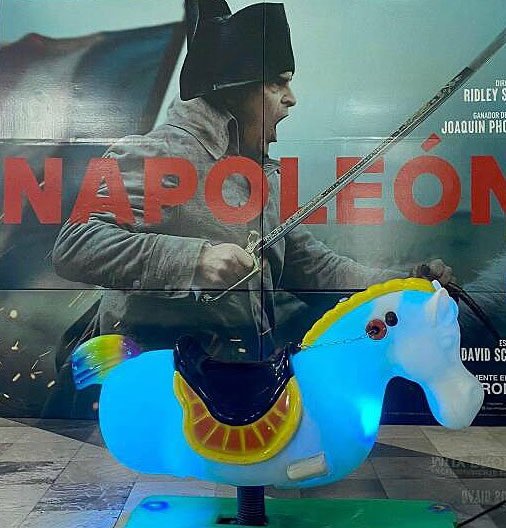
-
Looks like KS will have to deal to the security certificate when he's able.
K.S. is currently indisposed, vis site moderation, I have Mod powers, but there's nothing I can do about certs and such.
Please bear with us and ignore error message, but do report any new ones.
I'll cc Jigger.
-
Wot if they're not using Chrome?
Tho could be the same answer for Edge and/or Explorer
-
If you were to download and install Google's Chrome you may find a better experience.
Explorer sounds old, how old is the computer and laptop?
-
Q: what browser are you using?
-
Bangkok, ThailandCNN —
Thailand’s new government is moving ahead to pass new legisalation banning cannabis for recreational use in a major reversal 18 months after the country became the first in Asia to decriminalize the plant.
The relaxed laws saw a lucrative cannabis industry catering to locals and foreigners alike boom across the Southeast Asian nation, but a new conservative coalition government came to power late last year vowing to tighten the rules and only allow medical use.
A draft bill was released on Tuesday by Thailand’s health ministry outlining hefty fines or prison sentences of up to one year for offenders – or both.
Cannabis and cannabis-related products will be limited to medical and health purposes only, the bill states, echoing Prime Minister Srettha Thavisin’s pledge in September that his new government will “rectify” laws on cannabis within the next six months.
Smoking marijuana in public remained illegal even under the relaxed laws, but the proposed new laws will ban advertising and marketing campaigns for cannabis buds and extracts, and other cannabis products.
An earlier draft bill failed to win parliamentary approval in November.
Thavisin has been vocal about banning recreational cannabis and stated in several media interviews that drug abuse is “a big problem for Thailand.”
CNN has reached out to Thailand’s Health Minister Cholnan Srikaew for further comment about the new proposal.
Thailand became the first country in Asia to fully decriminalize cannabis in June 2022, a move years in the making and a rarity in a region where many countries give long jail terms and even death sentences for people convicted of marijuana possession, consumption or trafficking.
In nearby Hong Kong, even non-psychoactive cannabidoil (CBD) is outlawed.
Singapore maintains the death penalty for trafficking drugs, and residents traveling to Thailand are warned they could still be prosecuted on return if they smoke weed overseas.
Medical marijuana has been legal in Thailand since 2018, but decriminalization in 2022 took things a step further, making it no longer a crime to grow and trade marijuana and hemp products, or to use any parts of the plant to treat illnesses.
A weed hangover? Why Thailand’s having second thoughts about decriminalizing cannabis
Since then, thousands of cannabis dispensaries have sprung up across Thailand, as well as other cannabis-themed businesses like weed cafes and hemp spas and beauty treatment. Cities like Chiang Mai and the capital Bangkok have even held weed festivals, and decriminalization has been a major draw for tourists.
But Anutin Charnvirakul, the former health minister who strongly lobbied for cannabis legalization in the country, previously told CNN that the intention was never to allow Thais and tourists to smoke weed recreationally in public.
“Thailand will promote cannabis policies for medical purposes. There has never once been a moment that we would think about advocating people to use cannabis in terms of recreation – or use it in a way that it could irritate others,” Anutin said.
“We [have always] emphasized using cannabis extractions and raw materials for medical purposes and for health.”
Pro-legislation advocates have argued that the cannabis boom across Thailand has helped many Thais, from farmers to small business owners and workers behind the counter.
Cannabis entrepreneurs previously told CNN that they were strongly against any legalization that would hurt the growing multi-billion dollar industry.
The Future Cannabis Network, an advocacy group in Thailand, expressed disappointment at the government’s actions and stressed the importance of “public involvement.”
Kitty Chopaka, a Bangkok-based cannabis entrepreneur who has pushed for cannabis legalization for years, called it a knee jerk reaction from the government and said that it was “not unexpected.”
“But no matter what happens with the incoming cannabis regulations, it is now too late for cannabis to go back to being classified as narcotics.”
https://edition.cnn.com/2024/01/10/asia/thailand-cannabis-reverse-proposed-laws-intl-hnk/index.html
-
How to go nuclear at darts
Joe Bennett
January 10, 2024
SATIRE:
A week ago, 16-year-old Luke “The Nuke” Littler reached the final of the World Professional Darts Championship, attracting vast publicity and a global television audience.
It has since emerged that Luke is an alumnus of the St Helens Darts Academy. I had not previously heard of this institution, but now, by a masterstroke of columnar sleuthing, I have managed to acquire a copy of the academy's end-of-term examination.
Could you be the next Luke The Nuke? Take the test now. Choose the best answers in this nine-dart multi-choice questionnaire.
1. The great game of darts originated as
a. a means of introducing young men and boys to the art of warfare
b. a high-intensity weight-loss programme
c. a pub pastime that gratified men's competitive instincts while they drank beer
d. who cares?
2. The last word in the title “St Helens Darts Academy” is
a. an inadvertent commentary on 21st century culture
b. an excellent joke
c. derived from the name of the garden where Plato established the school that laid the foundations of Western philosophical thought
d. all of the above.
3. Luke The Nuke made headlines because his story
a. is redolent of David and Goliath
b. plays out a psychological archetype of hopeful regeneration
c. suggests the possibility of easy wealth to pasty teenagers
d. all of the above.
4. Luke The Nuke is
a. already many times richer than any of his high school teachers
b. addicted to playing computer games on his Xbox
c. devoted to fast food, especially doner kebabs, with one or more of which he habitually celebrates a victory
d. all of the above.
5. The live audience at the World Professional Darts Championship is
a. mainly students of ballistics
b. appreciative of the finer points of darts
c. hushed and reverent in the presence of athletic excellence
d. drunk.
6. The loose-fitting shirt traditionally worn by professional dart players, emblazoned with the names of sponsors and the players' mythologising nicknames (The Nuke being an example), is known as
a. a tent
b. a girth-mask
c. a Demis Roussos
d. a loose-fitting shirt.
7. In the history of child prodigies, such as Mozart who wrote his first symphony at 9, Picasso who was exhibiting paintings at 13, and Bobby Fischer who won the US men's chess championship at 14, Luke the Nuke ranks
a. up there with the best of them
b. No.1 because they're all dead
c. irrelevant because genius defies ranking
d. one hundred and EIGHTy
8. Darts is popular on television because
a. the audience see themselves in the players
b. the rules are bone-simple and the game is devoid of subtlety, complexity and even tactics
c. the action is non-stop, and there are frequent micro-orgasms within the macro-orgasm of the contest
d. all of the above
9. Televised professional darts is
a. a wonder of the world
b. the beginning of the end
c. no different from any other sport, the essence of all sports being a struggle for supremacy, mimicking the combative nature of existence, but without the nasty consequences of combat such as death. Darts also appeals to our love of skill, regardless of whether that skill has a practical value beyond the sporting arena, because it is the acquisition of skill that is the stamp of our species and the trait that has enabled us to proliferate.
d. bull
-
https://www.bangkokpost.com/thailand/general/2720989/father-daughter-drown-in-steel-boxes-babbling-son-detained.
SAKON NAKHON: A 35-year-old man has been detained for interrogation in the murder of his father and younger sister, whose bodies were discovered in locked steel boxes dumped in a pond.Residents of Ban Sang Khui iin Phang Khon district informed police on Monday that two large steel boxes they had briefly seen beside the pond were suddenly missing.
Police and rescue workers found the two boxes in the pond about 1am on Tuesday. They were raised to the surface and dragged ashore. The boxes were brand-new and held closed by steel chains. Upon opening, each was found to contain one body.
The bodies were later identified as Prayat Detphummee, 66, and his daughter Piangpen, 33. Police detained a 35-year-old man at the scene who was shouting and talking senselessly.
He was initially identified only as Waroot. Police learned that he was Prayat's son and Piangpen's elder brother.
The Thai News Agency reported that the family came from Sawang Daen Din district. A metal worker there told police Mr Waroot had bought two large steel boxes from him on Nov 25 last year for 12,000 baht.
He said Mr Waroot claimed he planned to the use the two cases to store fishing equipment.
Detectives from Sawang Daen Din police said relatives had been told the family were taking a trip to Bhumibol dam in Tak province. They left their home about noon on Monday, according to the Thai News Agency report.
The family was reportedly well-to-do and owned a three-storey dormitory. The mother was a retired government official and had died in October last year."
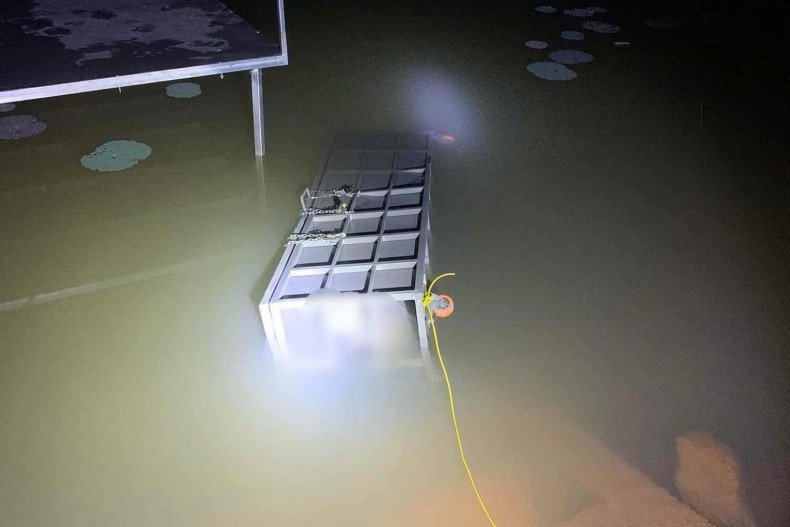
-
No one ever said, that you said, that the watch towers were manned. 😜
The competence comment, could also be applied, to the people not up towers, to people monitoring the system, from the little app on their phone, at the all day lunches they do, instead of sitting at their desks in front of a computer...I can just imagine it, Somchai opens the Tsunami app on his phone, he is presented with a singe screen, which displays one of two messages :: "Have" or "No Have".
-
Fargo Series 5, I'm about to savour the last two of 10 episodes.
Jon Hamm is brilliant as the Sheriff, who is the man all Trumpanzees want to be.
Excepting the last two episodes which I've yet to view, the rest is just how I imagine America to be.
-
I'm wondering if they have more than the one, or if their "other" data is from other countries systems, and buoys...
-
Note: misspellings are not mine, they are from the original article published Monday, January 08, 2024 in a Thai news website LINK.
_____
The Disaster Prevention and Mitigation Department said on Monday that its defective tsunami detection buoy in the Andaman Sea has been retrieved but assured that its warning system was still effective.
The department was responding to a comment posted on the Foundation of National Disaster Warning Council’s Facebook page. The post said that Thais should not bank on just the tsunami warning system as buoy “Station 23461” had stopped working and stopped feeding information into the warning system. The comment was posted on Saturday.
However, it was not until Monday that the department responded. It said that the problems with the Station 23461 buoy were nothing new, as the department had been seeking help from the Royal Thai Navy to retrieve it since August 7 last year.
The department said it had realised that the buoy had stopped feeding information into the system on August 3 and called on the Third Naval base to retrieve it for maintenance.
The buoy was stationed about 340 kilometres northwest of Phuket.
The department said it had purchased a replacement, and it was en route from the United States. It is scheduled to arrive in March and should be deployed by November this year.
The department added that the decommissioning of Station 23461 buoy will not make the department’s National Disaster Warning Centre (NDWC) less effective.
This is because the NDWC system also used information from other sources, both inside and outside Thailand to compile and simulate tsunami scenarios as a warning for people along Thai coastal provinces in time.
The department said the system used information from foreign partners in monitoring earthquakes in the Indian Ocean and other seas as well as data from tsunami buoys in the Indian Sea and water level measuring stations of India and Indonesia.
Data from water level measuring stations at Koh Mang in Phang Nga and Koh Racha Noi in Phuket are also taken for compiling.
The information will be comprehensive enough to issue a tsunami warning for Satun, Trang, Krabi, Phang Nga, Ranong and Phuket in time, the department assured.
Without a tsunami warning system, thousands of lives were lost when a tsunami hit the western and southern coastlines, particularly affecting popular tourist destinations like Phuket, Khao Lak, and Phi Phi Island. The waves reached up to 10 meters high in some areas, causing immense damage to infrastructure on December 26, 2004.
-----
What I really like is the image of a Tsunami they've used.
* not a real photo
-
update on Thaksin/hospital etc...
note: Published: 06:50, 08 January 2024 in Thai online news site - LINK
_____
...However, activists continue to pressure the DoC to permit them to visit Thaksin independently. They aim to ascertain whether his health conditions warrant his exclusion from a standard prison and if he enjoys any special privileges at the hospital. The DoC continues to resist these demands, citing potential violations of patient privacy rights and breaches of human rights agreements concerning individuals with health conditions, ...
-
Those 18 footers were beasts to control, all that sail and only a little bit the stern in the water. I've had several close calls when trying to drag them off in an A class.
vis
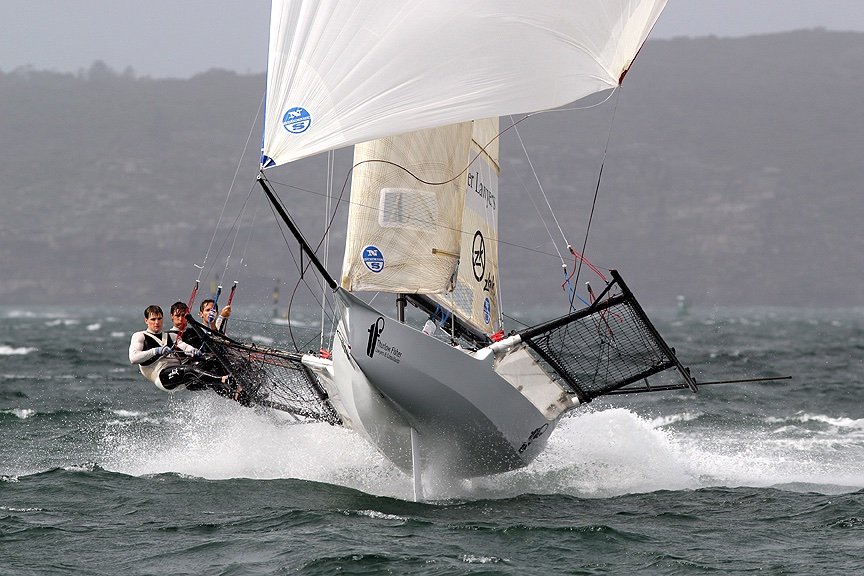

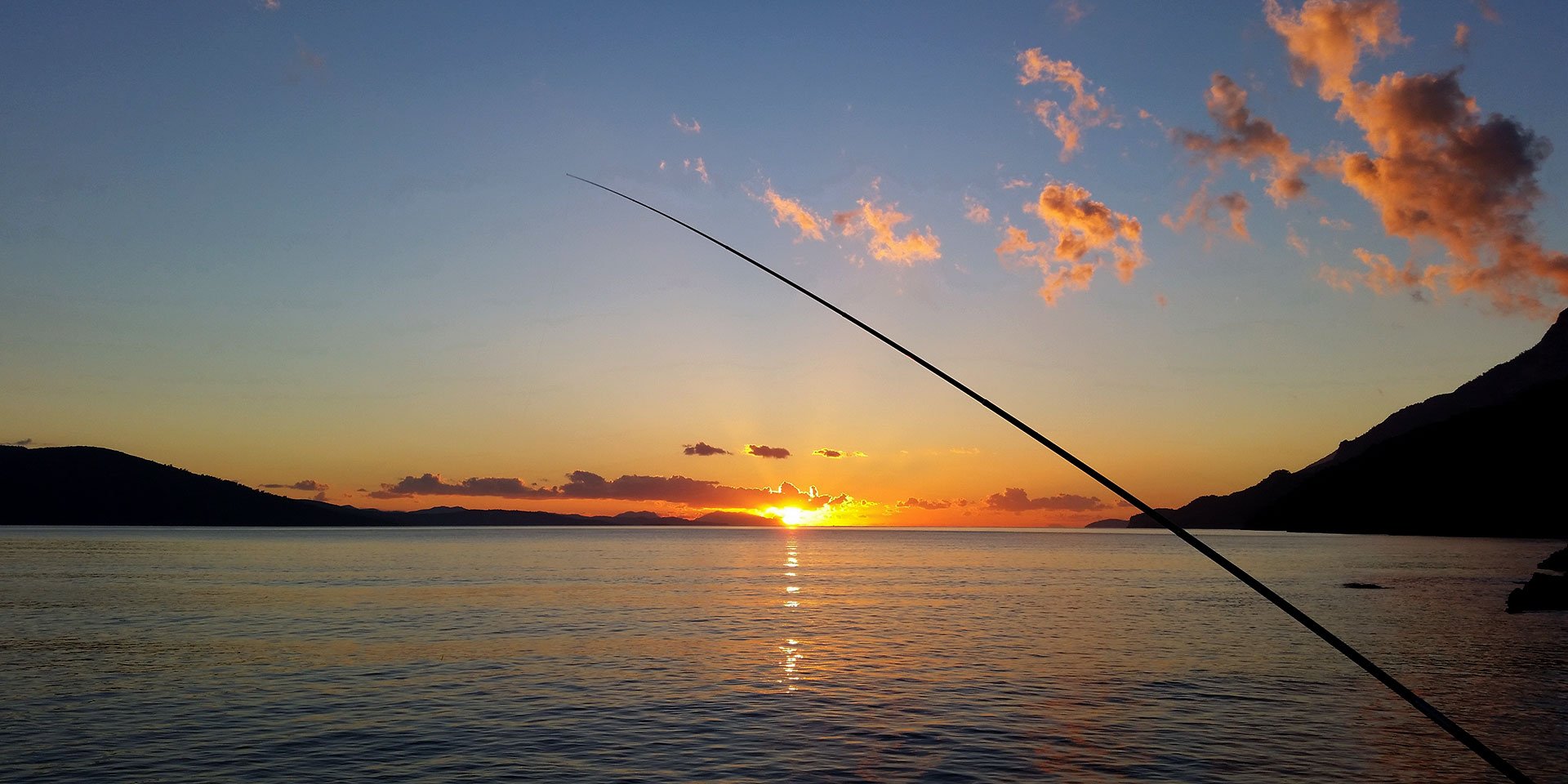
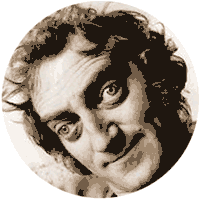
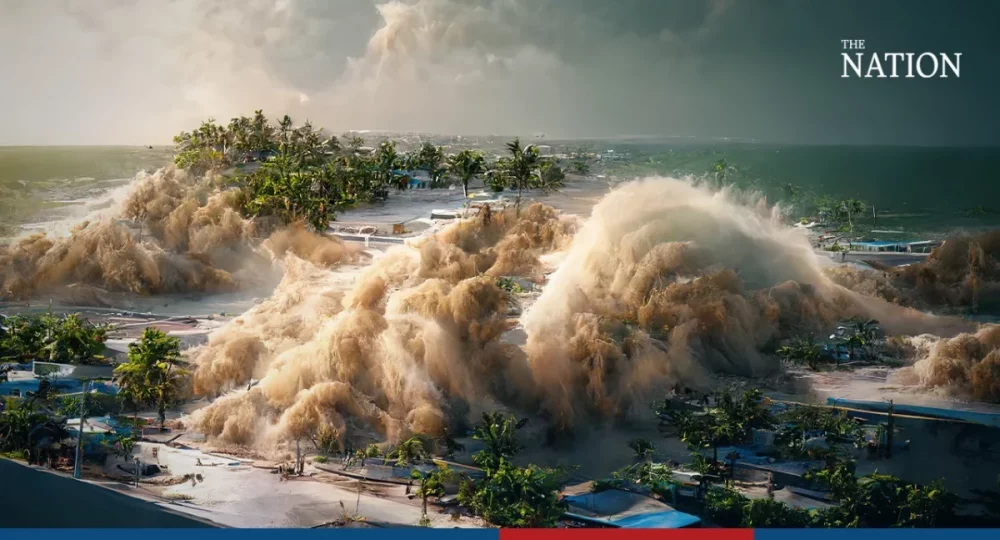
Opinion: Why We Should Care About “No Sunbathing” Sign At Bangkok’ Sanam Luang
in News
Posted
By Pravit Rojanaphruk, Senior Staff Writer - January 21, 2024 1:00 pm LINK
A sign posted at Sanam Luang in Bangkok prohibiting sunbathing on the lawn taken on Jan. 18, 2024.
The local authority in Bangkok finally puts up a “no sunbathing” and no wearing of bikinis sign at Sanam Luang on Thursday, a few days after some Thai netizens were outraged at the photos of two scantily clad Caucasian female tourists sunbathing at the lawn in bliss, but oblivious to the backdrop of the Emerald Buddha Temple and the Grand Palace behind.
The photos of the two foreign tourists were also used in the sign to make the point. It is rather cruel or inconsiderate to use the photo.
It is unclear whether the authorities were caving in to public pressure or exploited the incident to become more of a nanny state, but it came after City Hall police had to tell two female tourists on another day to stop sunbathing at the grass lawn of Sanam Luang.
One must admit that there is no consensus on the issue among Thais. Supporters of the ban, which comes with a modest 500 baht fine, say foreign tourists should be considerate to the host’s culture and Sanam Luang is just next to arguably the most important temple in Thailand and the Grand Palace – both are highly visible from the grass lawn of Sanam Luang.
Basically, when in Bangkok, do as Bangkokians do. No Thais sunbath at Sanam Luang. Well, to be fair, most Thais do not sunbath anyway – not even on the beach because we get so much sun, tropical heat on a daily basis and we are genetically mostly more tanned. Even Thai women with fair skin, mostly due to their Chinese DNAs, would mostly still prefer to maintain their fair-skin complexion because that is the prevailing preference as manifested by all kinds of skin whitening lotions that can be found in this country.
Many younger Thais and those who are more liberal say the authorities and angry netizens are just too fickle, so easily offended, however. They say what is the big deal since Sanam Luang is not inside the Grand Palace or the Emerald Buddha Temple, but dozens of meters away. Some added people are just trying to have a good vacation and we should try to be tolerant, not more restrictive, particularly if we want more foreign tourists.
To be fair, I think when Thais are ‘foreign tourists’ abroad themselves, some also do not know how to properly behave due to their ignorance (or lack of consideration), such as how to properly enjoy cherry blossom (Ohanami) in Japan without raising an eyebrow of locals – no touching of flower petals on the trees please, no shaking of tree branches and definitely no tree climbing, if you must know.
My concern is the creeping and normalization of a nanny state, however. I am less worried about whether it is right or wrong to sunbath at Sanam Luang because in the end people will have differing views and all should be considered. My concern is the risk of the proliferation of signs telling us what to do and what not to do to the point where many may unthinkingly obey and become docile to the directive of the state.
We can and should always debate whether certain laws and regulations are acceptable, reasonable or even just. Take the controversial and anachronistic lese majeste law, for example. Is sentencing a man earlier this week to prison for 50 years for 25 Facebook posts defaming the monarchy justifiable? Is it proportionate and just?
The truth is, the law is not automatically or always just because it is the law. A regulation is also not automatically reasonable, or right, because it is a regulation. That is why we debate about the continued existence of the death penalty and whether it is just. That is why we should be wary about the authorities putting up a no sunbathing sun sign at a place where we have no consensus whether it is right or not.
By Pravit Rojanaphruk, Senior Staff Writer - January 21, 2024 1:00 pm LINK